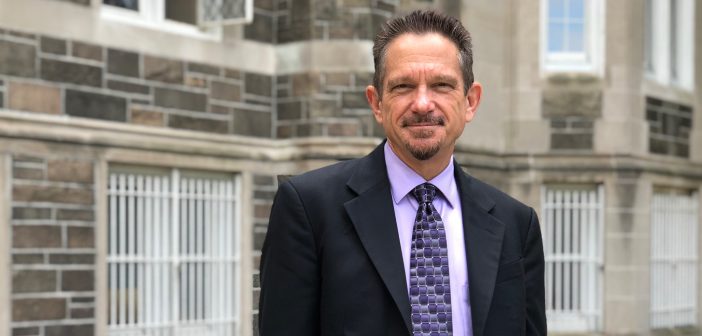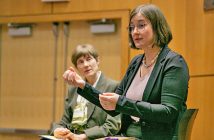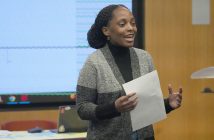Our phones are flooded with alerts and we are compelled to view them all because we feel “FOMO”—the fear of missing out, says Kirk A. Bingaman, Ph.D., an associate professor at the Graduate School of Religion and Religious Education. Our ability to give someone our full, undivided attention has therefore declined, he said. But he’s found a solution in a common religious practice—something he calls “contemplative spiritual practices.”
“In religious settings, [it’s] what we’ve always done to bring us closer to God, make us more spiritual,” Bingaman said. “In a digital world, we need to also be doing it to preserve the human attentional capacity.”
The practice is one of the major themes in Bingaman’s new book, “Pastoral and Spiritual Care in a Digital Age: The Future Is Now” (2018). In 143 pages, he details the threats and opportunities that advanced technology—including smartphones and social media—brings, and how the digital age has influenced how we define personhood.
The Power of Prayer and Meditation in the Digital Age
All readers—religious and atheist alike—can learn lessons from his book, especially the parts where Bingaman describes how people can preserve and increase their attentional stability in our hectic digital world, he said.
One way to hone our ability to focus is to regularly conduct contemplative spiritual practices, such as centering prayer—a method of meditation where one focuses on a sacred word or a mantra, like the Bible phrase “Do not be anxious,” and silently prays. Ideally, he added, one should pray this way for 20 minutes a day to achieve the desired effect.
Those who are not religious can turn to mindfulness meditation, he said. Instead of focusing on a religious word or phrase, one should focus on the rhythm of their breathing.
Plenty of people can use these practices in their professions, said Bingaman, including pastoral and spiritual care providers, counselors, clergy, chaplains, educators, and clinical care practitioners working with anxious clients.
As he talks about in the book, studies have shown that these mindfulness-based therapy exercises can change the brain for the better. If you practice them regularly, he explained, they have the power to shape the brain’s neural pathways and help stabilize one’s attention. And in the age of technology and digital distractions, he said, these contemplative-meditational practices are becoming comparably important to religious belief and doctrine.
Technology of the 21st Century
Bingaman’s book doesn’t focus only on the negative aspects of the digital age; he also gives credit to the ways that technology has made our lives easier.
Many of our daily errands are easily completed, thanks to advanced systems like self-checkout stands at the supermarket, cashless toll lanes at tunnels and bridges, and ATMs at the bank, Bingaman said. He added that medical technology, like cochlear hearing implants, can also have life-changing effects. He mentioned that thanks to those little chips, his father, who suffered from a loss of hearing, could once again hear the songbirds that he loved when he was young.
Bingaman also recalled a meeting with his financial adviser, who, thanks to a computer algorithms program, completed a complex procedure in a matter of minutes.
“My advisor’s brilliant, but he said, ‘I can’t even begin to compare to just the speed,’” Bingaman said, snapping his fingers, “‘and [the program]did it more precisely than I could’ve done it. I would’ve spent hours on it.’”
In his book, Bingaman explores this new hybrid humanity—a mix between natural biology and technology—and the theological implications for religious faith communities.
“What constitutes human personhood in an age of increasing technological enhancement?” he asked. “If we’re more and more technologically enhanced, how will we be a reflection of the divine image in the future?”
But at the rate that machine intelligence is advancing, Bingaman stressed, the most important question isn’t about meditation or even machinery: It’s about who we are and who we want to become.
“How do we hold onto our humanity?” he said. “How do we preserve the most precious qualities of human experience, while we have this window of time and opportunity?”



